|
|
|
Sort Order |
|
|
|
Items / Page
|
|
|
|
|
|
|
| Srl | Item |
| 1 |
ID:
139591
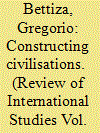

|
|
|
|
|
| Summary/Abstract |
Since 11 September 2001, the ‘Muslim world’ has become a novel religio-culturally defined civilisational frame of reference around which American foreign policy has been partly reoriented and reorganised. In parallel, the ‘Muslim world’, is increasingly becoming, at this historical juncture, a civilisational social fact in international politics by being progressively embedded in, and enacted onto the world by, American foreign policy discourses, institutions, practices, and processes of self-other recognition. This article theoretically understands and explains the causes and consequences of these changes through an engagement with the emerging post-essentialist civilisational analysis turn in International Relations (IR). In particular, the article furthers a constructivist civilisational politics approach that is theoretically, empirically, and methodologically oriented towards recovering and explaining how actors are interpreting, constructing, and reproducing – in this case through particular American foreign policy changes – an international society where intra- and inter-civilisational relations ‘matter’.
|
|
|
|
|
|
|
|
|
|
|
|
|
|
|
|
| 2 |
ID:
139587
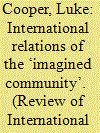

|
|
|
|
|
| Summary/Abstract |
Benedict Anderson's Imagined Communities has long been established as one of the major contributions to theories of nations and nationalism. Anderson located the rise of national identities within a long-evolving crisis of dynastic conceptions of identity, time, and space, and argued print-capitalism was the key cultural and economic force in the genesis of nations. This article offers a critical appropriation and application of Anderson's theory through two steps. Firstly, it evaluates the conceptual underpinning of his approach through an engagement with recent scholarship on the ‘theory of uneven and combined development’. The fruits of this interchange provide a deeper analytical framework to account for what Anderson calls the ‘modularity’ of national identity, that is, its universal spread across the globe. Modularity is now reconceptualised as a product of combined development with its causal efficacy derived from the latent dynamics of a geopolitically fragmented world. The latter gave shape and form to the new national communities. Secondly, this revised framework is applied to the emergence of Chinese national identity in the late nineteenth century. This allows Chinese nationalism to be recast as an ideological amalgam of indigenous and imported elements that emerged out of the crisis-ridden encounter between Imperial China and Western imperialism in the nineteenth century.
|
|
|
|
|
|
|
|
|
|
|
|
|
|
|
|
| 3 |
ID:
139590
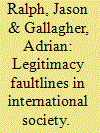

|
|
|
|
|
| Summary/Abstract |
There is a perceived legitimacy deficit in contemporary international society. A symptom of this is the political contestation surrounding the 2011 Libyan crisis and its influence on the 2011–13 Syrian crisis. This involved criticism being levelled at the coalition led by the so-called Permanent-3 for the way they implemented the protection of civilians mandate, as well as for the referral of the Libyan situation to the International Criminal Court. How the P3 respond to these developments will be driven in part by how this ‘legitimacy fault line’ is interpreted. The purpose of this article is to first give an interpretation that is informed by the work of contemporary English School scholars and the political theorists they draw on; and second to provide the context in which specific policy recommendations may guide the response of the P3 states. We argue that because the new legitimacy fault line divides on the procedural question of who decides how international society should meet its responsibilities rather than substantive disagreements about what those responsibilities are (that is, human protection and justice) the challenge to the liberal agenda of the P3 is not radical. However, we also argue that ignoring the procedural concerns of the African and BRICS states is not outcome neutral and could in fact do harm to both the ICC and the wider implementation of R2P. We consider two proposals for procedural reform and examine how the P3 response would impact on their claim to be good international citizens.
|
|
|
|
|
|
|
|
|
|
|
|
|
|
|
|
| 4 |
ID:
139592


|
|
|
|
|
| Summary/Abstract |
This article intends to contribute to the theorising of institutional change. Specifically, it asks how dynamics in the ‘deep structure’ of international society correspond to changes in more specific institutions as embodied by regimes and international organisations. It does so by taking up the distinction of primary and secondary institutions in international society advocated by scholars of the English School. It argues that, while the differentiation offers analytical potential, the School has largely failed to study secondary institutions such as international organisations and regimes as autonomous objects of analysis, seeing them as mere materialisations of primary institutions. Engaging with the concepts of structuration and path dependence will allow scholars working in an English School framework to explore more deeply the relation between the two kinds of institutions, and as a consequence devise more elaborate theories of institutional change. Based on this argument, the article develops a theoretical model that sees primary and secondary institutions entangled in distinctive processes of constitution and institutionalisation. This model helps to establish international organisations and regimes as a crucial part of the English School agenda, and to enlighten the political mechanisms that lead to continuity and change in international institutions more broadly.
|
|
|
|
|
|
|
|
|
|
|
|
|
|
|
|
| 5 |
ID:
139585
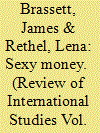

|
|
|
|
|
| Summary/Abstract |
The article develops a critical analysis of gendered narratives of global finance. The post-subprime crisis equation of unfettered global finance with the excessive masculinity of individual bankers is read in line with a wider gender narrative. We discuss how hetero-normative relations between men and women underpin financial representations through three historical examples: war bond advertising, Hollywood films about bankers, and contemporary aesthetic representations of female politicians who advocate for austerity. A politics emerges whereby gender is used to encompass a/the spectrum between embedded and disembedded finance, approximate to the divide between oikonomia and chrematistics. The apparently desirable ‘marriage’ between the state and finance that ensues carries several ambiguities – precisely along gender lines – that point to a pervasive limit: the myth of embedded liberalism in the imagination of global finance.
|
|
|
|
|
|
|
|
|
|
|
|
|
|
|
|
| 6 |
ID:
139586


|
|
|
|
|
| Summary/Abstract |
Social legitimacy is central to the effectiveness of international organisations (IOs). Yet, so far, we have little systematic knowledge about what drives citizens to support or oppose IOs. In this article, we isolate and assess three alternative explanations of social legitimacy in global governance, privileging interest representation, institutional performance, and confidence extrapolation. We test these theories in a multilevel analysis of citizen confidence in the United Nations (UN) using World Values Survey and European Values Study data, supplemented by contextual measures. The results grant support to the arguments that institutional performance and confidence extrapolation shape popular confidence in the UN, while offering little support for the explanation of interest representation. These findings challenge the predominant understanding that more democratic procedures lead to greater social legitimacy for IOs. Instead, the UN case suggests that the social legitimacy of IOs is based primarily on the organisations' capacity to deliver, as well as on citizens' general confidence in political institutions, which IOs may have little to do with and can do little to change.
|
|
|
|
|
|
|
|
|
|
|
|
|
|
|
|
| 7 |
ID:
139593
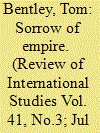

|
|
|
|
|
| Summary/Abstract |
Unexpectedly, several prominent European countries have begun to issue official state apologies to their former colonies. What does this proliferation of official colonial sorrow from such countries as Germany, Belgium, Italy, and Britain reveal about the normative tenets of the contemporary international order? This article analyses colonial apologies as crucial symbolic and ritualistic sites where state elites project liberal credentials and affirm liberal normative tenets in the international system. Specifically, the article demonstrates how these apologies for colonial atrocity appear to reinforce liberal conceptions of human rights, the renunciation of violence, cordial relations with formerly colonised states, and commitments to state accountability and transparency. Yet, textual analysis of several state apologies reveals that these performatives simultaneously contradict each of these liberal tenets. It finds that – even in apology – political elites reflect ambivalence about certain human rights violations; persist in glorifying or sanitising the violent colonial past; recycle paternalistic and hierarchical discourses and policies towards the apology's recipients; and offer contradictory notions of the state's historical responsibility. In exposing these performative contradictions of empirical sorrow, the article seeks to expand the discipline's understandings of, and dilemmas within, a key performative and ritualistic legitimation strategy whereby liberalism reproduces itself in the international system.
|
|
|
|
|
|
|
|
|
|
|
|
|
|
|
|
| 8 |
ID:
139589


|
|
|
|
|
| Summary/Abstract |
US exceptionalism is a hot topic in contemporary political discourse in the United States and in recent years it has attracted increasing attention from International Relations (IR) scholars. Unfortunately, however, analysis of US exceptionalism in has been compromised by its failure to historicise the concept and by its reliance on myths cultivated in other disciplines. This article offers a critical genealogy of US exceptionalism in order to expose it for what it is: a discourse that works to legitimate the United States' exceptions to domestic and international law in the minds of its citizens and foreign observers.
|
|
|
|
|
|
|
|
|
|
|
|
|
|
|
|
| 9 |
ID:
139588


|
|
|
|
|
| Summary/Abstract |
In 2007, the British Journal of Politics and International Relations (BJPIR) devoted an issue to gendering International Relations. It opens with Cynthia Enloe addressing the ‘politics of casual forgetting’. I investigate this notion of casual forgetting using a framework informed by postcolonial and feminist scholarship. Working with ideas drawn from critiques of Orientalism and neoliberalism, I examine knowledge practices that centre binaries as forms of objectivity that disembed phenomena from context, and as forms of over-simplification that flatten the appearance of complexity. Together, these practices have a depoliticising effect; they obscure contestation, situate hierarchy as natural, and separate analysis from its embeddedness in historical and political conditions, even in work guided by critical agendas. I trace these depoliticising practices in a conversation in the 2007 Special Issue of BJPIR and show that Enloe's comments present a push for critical analysis that was overlooked by the Special Issue's editors in their attempt to more clearly delineate the subdiscipline of Gender and International Relations (IR) as distinct from feminist IR. This article suggests that Enloe's plea is effectively one for ‘active remembering’ as a way to render visible the insidious forms of power that give a stable appearance to categories of social phenomena.
|
|
|
|
|
|
|
|
|
|
|
|
|
|
|
|
|
|
|
|
|